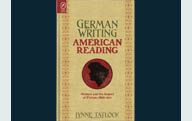
German Writing, American Reading: Women and the Import of Fiction, 1866-1917 (Columbus: Ohio State University Press, 2012) In post-bellum America, publishers vigorously reprinted books that were foreign in origin, and Americans thus read internationally even at a moment of national consolidation. A subset of Americans’ international reading—nearly 100 original texts, approximately 180 American translations, over 1,000 editions and reprint editions, and hundreds of thousands of books strong—comprised popular fiction written by German women and rendered by American women. This study examines the genesis and circulation in America of this hybrid product over four decades and beyond. German Writing, American Reading: Women and the Import of Fiction, 1866-1917 by Lynne Tatlock examines the genesis and circulation in America of this hybrid product over four decades and beyond. These entertaining novels came to the consumer altered by processes of creative adaptation and acculturation that occurred in the United States as a result of translation, marketing, publication, and widespread reading over forty years. These processes in turn de-centered and disrupted the national while still transferring certain elements of German national culture. Most of all this mass translation of German fiction by American women trafficked in happy endings that promised American readers that their fondest wishes for adventure, drama, and bliss within domesticity and their hope for the real power of love, virtue, and sentiment could be pleasurably realized in an imagined and quaintly old-fashioned Germany—even if only in the time it took to read a novel.
Review: “German Writing, American Reading substantially broadens existing transatlantic cultural and literary studies. Traditionally, scholarship in transatlantic literary studies has focused either on the importation of literary motifs, themes, or styles across national literary borders or on the reception of works from one national context into another. While Lynne Tatlock’s exceptional book does both, it also mines a wealth of other material ranging from publishers’ records, copyright law, and marketing practices to the economics and politics of translation. The result is an unprecedented investigation of the processes of transatlantic cultural transfer.” —Kirsten Belgum, associate professor of Germanic Studies, The University of Texas at Austin




